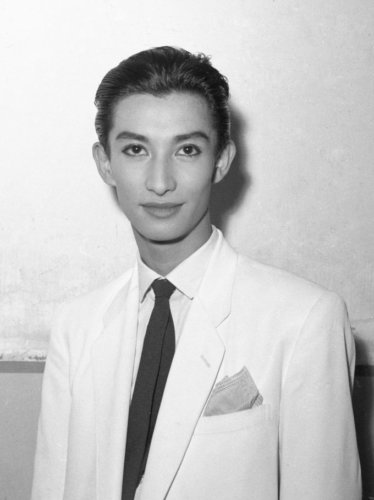
This is a true story of a singer who has an amazing psychic ability to see ghosts and to predict a person’s death.
Akihiro Miwa (born 1935) is a Japanese singer and actor.
Miwa was born the second boy of five brothers in Motoshikkui-machi, Nagasaki city, Nagasaki, Japan in 1935.
His father, Sakuichi Maruyama, run a café named “Sekai (The world)” in Maruyama Yukaku where brothels recognized by the government was situated.
The Survivor of Nagasaki Atomic Bombing
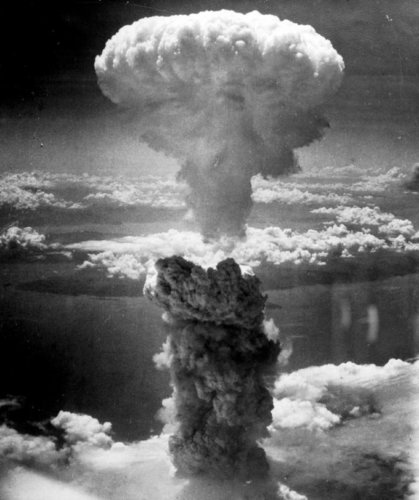
On August 9, 1945, it was a beautiful sunny day without a cloud in the sky.
At that time, Miwa was a 10 years old boy.
He was at home, making a picture of Manju princess of Otogi-zoshi, a Japanese narrative literature, for homework during the summer vacation.
After completing the picture, Miwa happened to take a few steps away from the window to check his finished work.
Suddenly, he was dazzled by a brilliant white light.
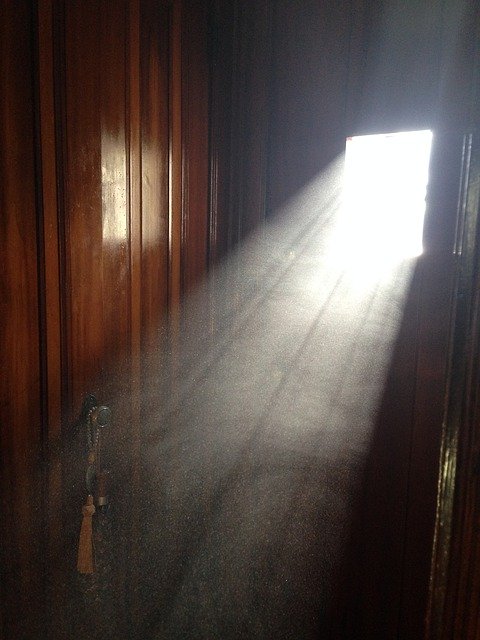
It was like thousands of magnesium flare burning in the air.

It was actually the explosion of an atomic bomb dropped on Nagasaki by the United States Army Air Forces B-29 bomber.
Fortunately, Miwa narrowly escaped being burned to death by the intense flash of strong thermal radiation of the atomic bomb, because he moved away from the window just before the explosion.
Was that a flash of lightning?
That’s odd, it’s sunny today.
The 10-year-old boy wondered.
Immediately after the flash, Miwa felt that the world was surrounded by thick silence.
But the next moment, he heard the sound of a huge explosion and the whole house began to tremble violently with the blast.
The house shook so hard that it was tilted.
Miwa was urged by the housekeeper to hide together in bed.
Then he heard the sound of air-raid sirens.
Atomic cloud over Nagasaki from Koyagi-jima by Hiromichi Matsuda
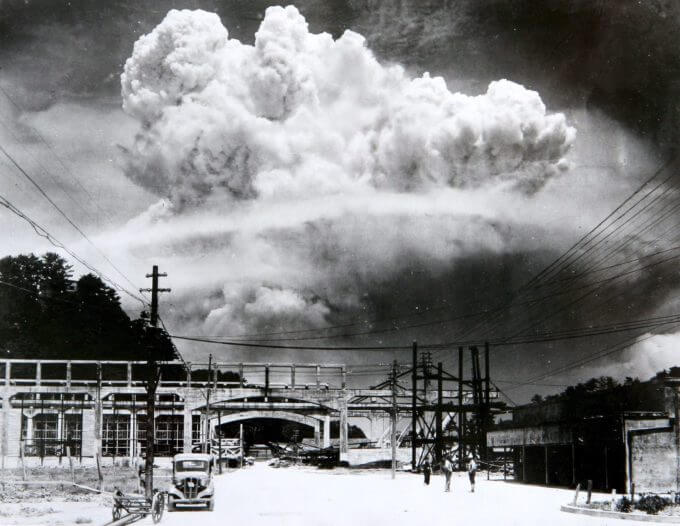
After that, Miwa found one of his brothers stuck under a desk, who was tossed by the bomb blast.
After helping the brother stand up, Miwa went towards an air-raid shelter with the brother and the housekeeper.
Miwa was shocked to learn that the familiar sight was utterly changed.
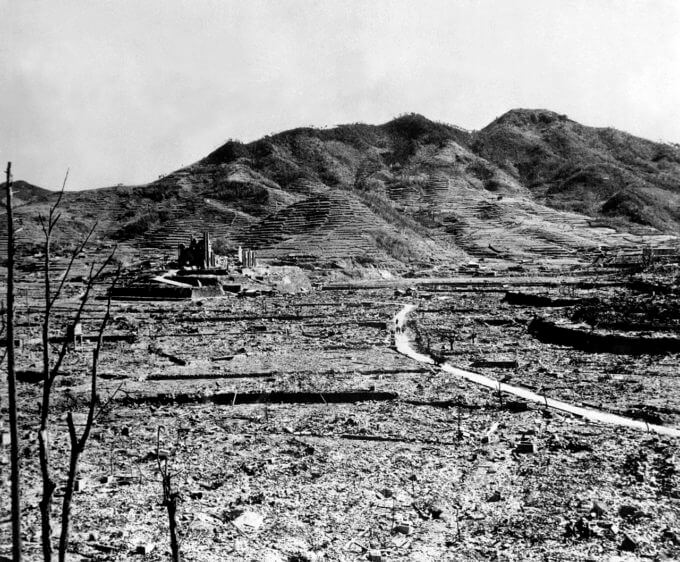
The ceiling of the theater adjacent to the air-raid shelter was crashed down.
The Nagasaki Prefecture Report on the bombing characterized Nagasaki as “like a graveyard with not a tombstone standing.”
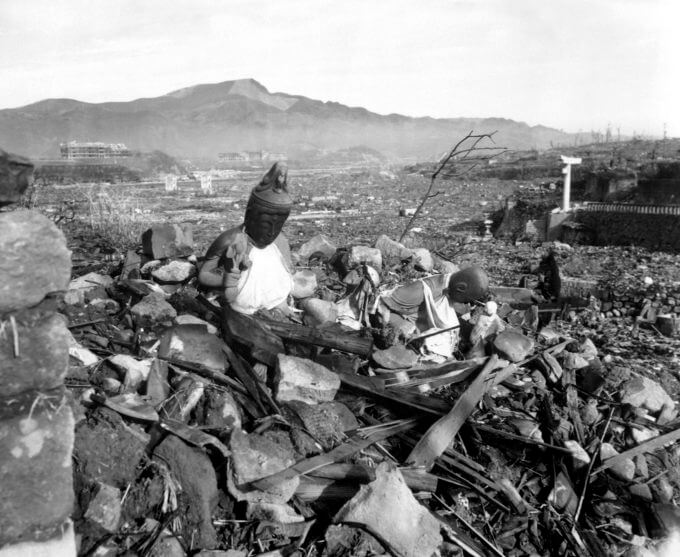
Furthermore, the dormitory of the women’s volunteer corps was completely destroyed.
Urakami Tenshudo (Catholic Church in Nagasaki) destroyed by the bomb, the dome/bell of the church, at right, having toppled off
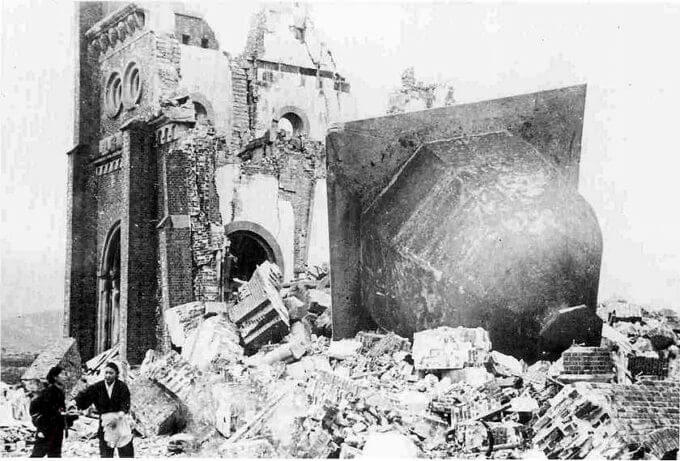
A few days later, on August 15, 1945, the last day of the Pacific War, Miwa went alone to his mother’s parents’ house near the epicenter to find his grandmother.
To his amazement, a lot of dying people flocked the house for water.
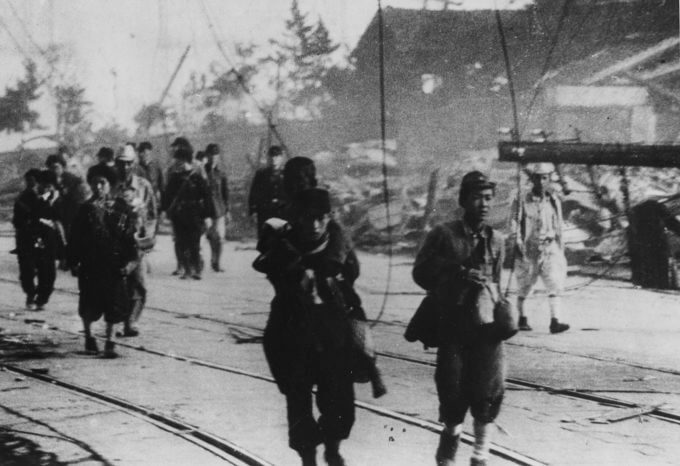
So, his whole family gave water to those bomb victims.
Miwa gave water to a female bomb survivor.
She joined her hands to express her appreciation in front of him and calmly left.
Miwa was so surprised, because he was just a little child.
Recalling that time, Miwa said,
That was indeed hell.
Nevertheless, he says later,
That hellish sight is the foundation for creating my songs.
Especially, Miwa learned “unconditional love” which is one of his themes, from one of the victims of the atomic bombing who was dead holding a little baby.
His hometown was about 4 kilometers (about 2.5 miles) from the epicenter, but he was miraculously unhurt.
However, Miwa later suffered from the effects of the atomic bomb.
From his own experience of the atomic bombing of Nagasaki in his childhood, Miwa criticizes Japanese militarism in the WWII.
Furthermore, Miwa is against the 2015 Japanese military legislation and Prime Minister Abe’s regime.
He says,
Prime Minister Abe and those who voted for the Liberal Democratic Party should go to the front as Japanese soldiers firstly.
Miwa’s Start as a Professional Singer
In spring 1951, when he was 15 years old, Miwa dreamed of being an opera singer, such as Enrico Caruso (1873 – 1921), an Italian operatic tenor and Beniamino Gigli (1890 – 1957), an Italian opera singer.
So, Miwa moved to Tokyo to enter Kuchitachi Music School (present-day a high school affiliated with the Kunitachi College of Music).
A junior high school and a high school affiliated with the Kunitachi College of Music
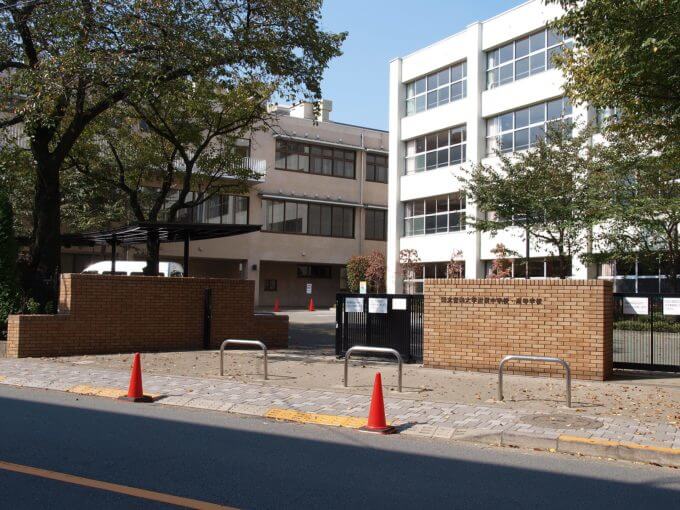
However, since his father’s family business became bankrupt, Miwa decided to drop out of the high school.
After the dropout, he visited the Allied Occupation forces and sang jazz at US Army camps to get money.

That was his start as a professional singer.
In 1952, Miwa slept rough at the Shinjuku Station.
But one day, he happened to find an advertisement for recruiting a handsome boy of chanson café, “Ginpari” (Silver Paris) in Ginza 7-chome.
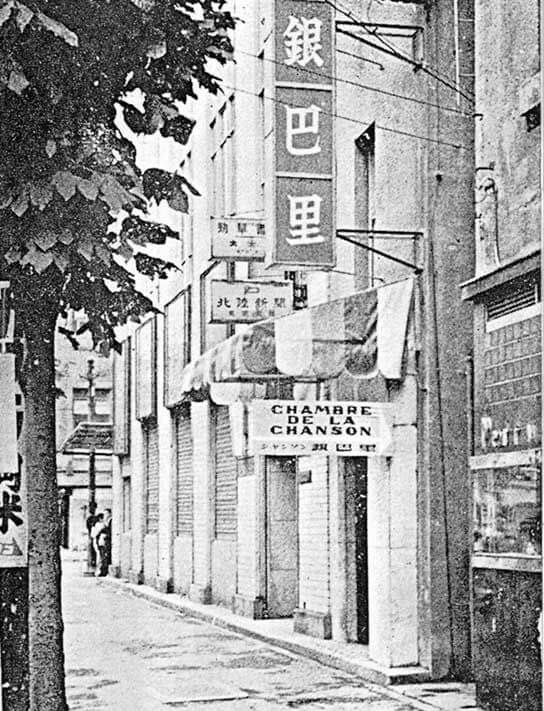
Miwa applied for a singer and signed an exclusive contract with Ginpari and debuted as a singer.
Miwa gained popularity as a singer of unknown nationality, age and gender and became popular among persons of culture including a writer, Yukio Mishima (1925-1970), a well-known Japanese author.
Yukio Mishima (1925-1970)
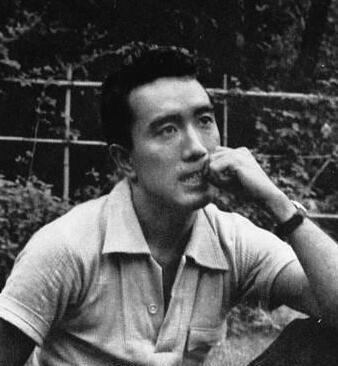
In 1957, Miwa made a cover of a French Chanson, Méqué méqué that is what made him famous overnight.
Miwa was so fair-faced boy that Mishima highly praised his appearance as “celestial beauty.”
So, he was touted as a beautiful boy in the media.
In 1964, Miwa first released the “Yoitomake no Uta” (“The Song of the Yoitomake“).
In 1965, “Yoitomake no Uta” received a great response and about 400,000 records of this song were sold.
Although Miwa is better known as a cabaret singer he has also appeared in a number of films.
In 1968 he starred in and composed the theme song for Kinji Fukasaku’s Black Lizard, based on Yukio Mishima’s stage adaptation of the Edogawa Rampo novel.
Miwa’s Amazing Spiritual Power
From 2005 to 2010, Miwa co-hosted the successful weekly television program Ora no Izumi (The spring of aura) alongside spiritual counselor Hiroyuki Ehara and Tokio member Taichi Kokubun.
While the show initially aired as late-night program, its popularity bumped it up to a primetime slot in 2007.
By the way, Miwa was known for his amazing clairvoyant power to see ghosts and other spiritual things.
Actually, Miwa predicted the unfortunate end of Yukio Mishima.
One day in 1969, a party was held at Mishima’s house and Miwa was invited to the party.
At that time, Miwa saw a strange figure behind Mishima.
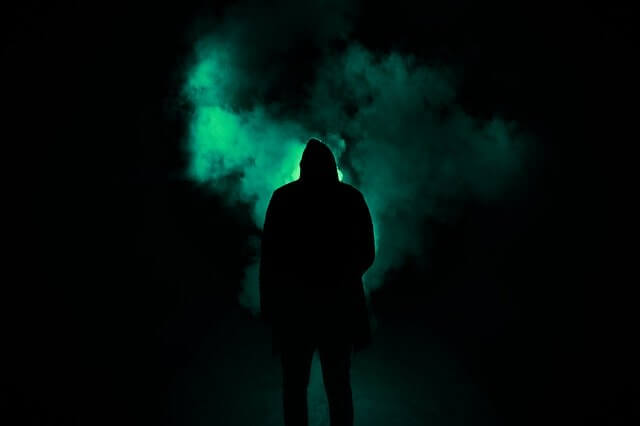
What’s that figure?
Miwa looked carefully and found that it was the ghost of a young officer of the Imperial Japanese Army.
So, Miwa advised Mishima,
I saw you are possessed by the spirit of a young army officer.
He was executed for February 26th Incident.
Mishima was surprised to hear Miwa’s advice.
So, Mishima asked him,
Who possessed me?
I’ll pick the names of young army officers at random.
If there is any name that rings a bell, please let me know!
Then, Mishima picked the names of young army officers at random just for fun.
This guy?
No, he is not.
Mishima and Miwa repeated questions and answers over and over again.
After a while, Mishima picked the name of a young army officer,
Asaichi Isobe
At that moment, Miwa nodded in agreement.
Yes, it’s he.
He possesses you!
To hear that, Mishima’s expression suddenly changed.
The February 26th Incident
Asaichi Isobe (1905 – 1937) was an officer of the Imperial Japanese Army (IJA) who was one of the leaders of the February 26th Incident.
Asaichi Isobe (1905 – 1937)
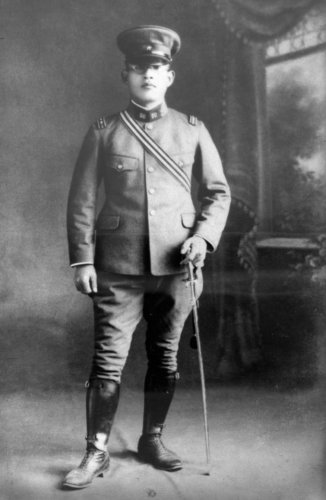
The February 26th Incident was organized by a group of young officers of the Imperial Way Faction.
The young officers believed that the privileged class exploited the Japanese people and lead to widespread poverty in rural areas, and deceived the Emperor, usurping his power and weakening Japan.
However, by rising up and destroying the evil advisers around the Throne, they would enable the Emperor to re-establish his authority and then the Emperor would purge Western ideas and those who exploited the people, restoring prosperity to the nation.
It was their solution called “Showa Restoration” modeled on the Meiji Restoration of 70 years earlier.
The rebels succeeded in assassinating several leading officials including two former prime ministers and in occupying the government center of Tokyo.
Rebel soldiers during the riot on February 26, 1936 in Tokyo
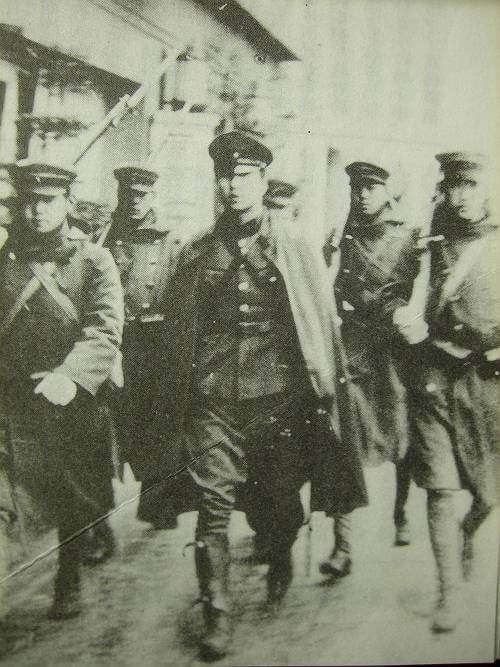
Rebel troops in February 26 Incident. 1st Lt. Yoshitada Niu and his company on February 26, 1936.
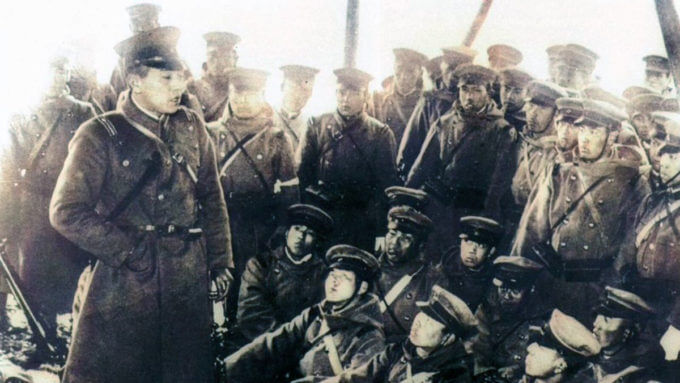
The young officers prepared an explanation of their intentions and grievances in a document entitled “Manifesto of the Uprising.”
They handed their manifesto to the Emperor through Minister of War, Yoshiyuki Kawashima, but the Emperor refused and demanded that Kawashima suppress the uprising.
Hirohito in his early years as Emperor
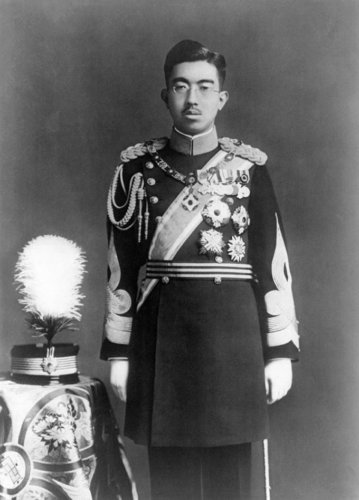
So, the rebel army of less than 1,500 was surrounded by more than 20,000 loyal government troops and 22 tanks and they were urged to surrender without a fight.
As a result, some of the young officers committed suicide and the remaining leaders including Isobe were executed by firing squads.
Before the execution, Isobe wrote diaries and notes titled “behavioral record,” “prison diary” and “prison notes.”
In these diaries and notes, Isobe claimed the legitimacy of his “Showa Restoration” and lamented that he was finally abandoned by the Emperor.
Especially, in the “prison diary,” Isobe severely remonstrated with the Emperor Hirohito.
So, Isobe did not hurrah for the Emperor when he was executed.
Mishima Was Possessed by the Spirits of Young Officers
After Isobe’s death, Mitsuhisa Hiraishi, a prison guard of the Tokyo Army Prison took Isobe’s diaries and notes secretly.
Those diaries and notes were published in the March 1967 issue of a Japanese literary magazine “Bungei” published by Kawade Shobo Shinsha.
The cover of the first issue of Bungei in October, 1933.
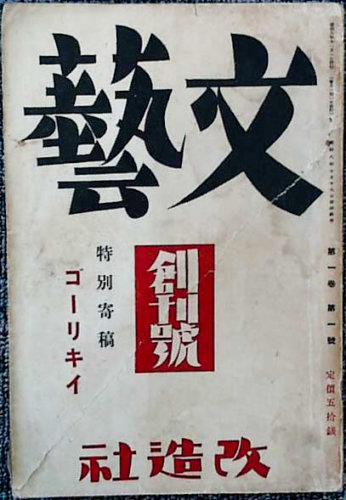
Mishima was interested in the February 26th Incident, particularly in one of the leaders, Asaichi Isobe.
Mishima extolled the Isobe’s diaries and notes.
So, in 1966, Mishima published “The Voice of Heroic Spirits” in the June issue of “Bungei” under the influence of Isobe’s diaries and notes.
The story of “The Voice of Heroic Spirits” is really mysterious.
The protagonist attended a séance hosted by Kimura to communicate with spirits through a young medium, Shigeo Kawashima.
Kawashima was possessed by the spirits of young officers who organized the February 26th Incident and the spirits of kamikaze pilots who made suicide attacks against Allied naval vessels in the closing stages of the Pacific campaign of WWII.
The protagonist recorded exactly what he saw and heard in the spiritual session.
But the protagonist heard the spirits of young officers and kamikaze pilots shouting curse against the Emperor who let them down.
The medium, Kawasaki was finally killed by the overpowering curses of the spirits.
The protagonist found that the face of Kawasaki was changed to someone’s obscure face.
As described above, it was like Mishima wrote “The Voice of Heroic Spirits” to speak for the spirits of Japanese soldiers who were betrayed by the Emperor.
So, as Miwa pointed out, perhaps Mishima was possessed by the spirits of young officers who were involved in February 26th Incident.
Miwa Predicted the Death of Mishima
On December 1960, Mishima published a short story titled Yukoku (Patriotism).
The story of Patriotism centers around the experiences of Lieutenant Shinji Takeyama and his young wife, Reiko, and their ritualistic suicide following the February 26th Incident.
Mishima said about Patriotism,
It contains all my thoughts.
However, Miwa’s clairvoyant power revealed the truth about Mishima’s Patriotism.
Miwa said,
Actually, the spirits of young officers possessed Mishima to write of their thoughts.
One year, Miwa was invited to the New Year celebration in Mishima’s house.
In the celebration, there were the members of the Roman theater, a theatre group formed by Mishima and the members of the Tatenokai (“shield society”), a private militia dedicated to traditional Japanese values and veneration of the Emperor.
At that time, Miwa saw through his spiritual eyes the spirit of an officer of the military police who was involved in the February 26th Incident.
So, Miwa asked Mishima about Patriotism.
When you were writing Patriotism, have you felt like you became a different person?
Mishima replied,
Yes, I did.
It was exactly as you said.
Strangely, no matter how sleepy I was, my hand holding a pen moved with a fluid motion.
I could not stop writing!
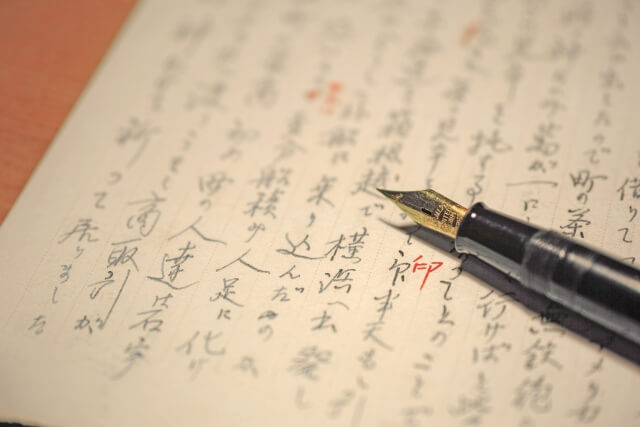
When I finished writing the draft, I reread it.
I was still dissatisfied with it.
So, I tried to rewrite it, but a mystic force prevented me from rewriting it.
That was a mysterious experience!
Therefore, Miwa thinks that Patriotism was not written by Mishima alone, but it was actually written by the spirit of the officer involved in the February 26th Incident.
Furthermore, Miwa saw dreadful forebodings on Mishima’s face that night.
So, on March 1970, Miwa advised Katsumasa Uchida (1944 – 2020), a Japanese actor who played the role of the Prophet, Jokanaan in the play Salome in the Roman theater.
Miwa advised Uchida,
I feel something bad will happen to Mr. Mishima in 1970.
You have frequent contact with him.
So, take extra care to ensure your safety in 1970.
Miwa’s hunch proved true.
On November 25, 1970, Michima and four members of the Tatenokai visited the commandant of the Ichigaya Camp, the Tokyo headquarters of the Eastern Command of the Japan Self-Defense Forces.
They barricaded the office and tied the commandant to his chair.
With a prepared manifesto and a banner listing their demands, Mishima stepped onto the balcony to address the soldiers gathered below.
Mishima delivering his speech in the failed coup attempt just prior to performing seppuku (November 25, 1970)
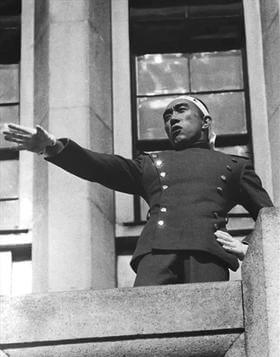
Mishima’s speech was intended to inspire a coup d’etat to restore the power of the Emperor.
After he finished his planned speech after a few minutes, Mishima returned to the commandant’s office and performed seppuku.

Source – Work by Rama
The coup is called “Mishima Incident.”
Strangely enough, Mishima’s bizarre words and actions during his last years were just like those of the tragic young officer Asaichi Isobe executed 34 years before.
So, just as Miwa pointed out, Mishima in his late years was possessed by the spirit of the young officer.
Actually, Mishima finally committed suicide just like some of the young officers involved in the February 26th Incident.
Published on April 26, 2020
Written by OTAKUPAPA
References
- Akihiro Miwa in Wikipedia.
- TV Asahi SmaSTATION-5 Special Edition “Yukio Mishima, a literary genius told by Akihiro Miwa.”
- Ryo Kawano (November 1986). “Celebrities’ Horror Experiences of Seeing a Ghost.”
- Yukio Mishima in Wikipedia.
- February 26th Incident in Wikipedia.
- Asaichi Isobe in Wikipedia.

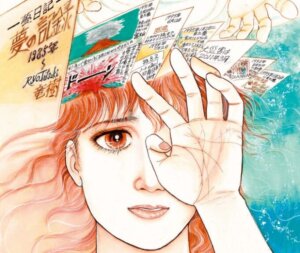
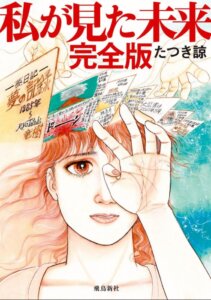
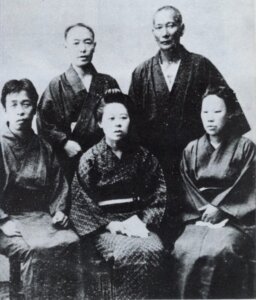

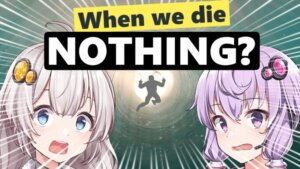
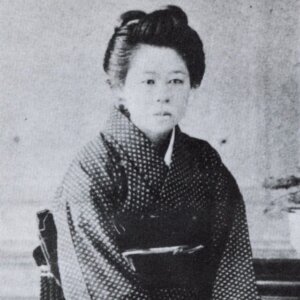
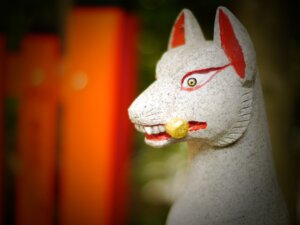
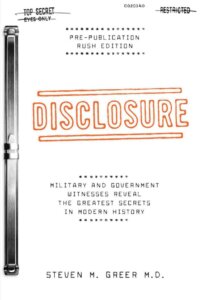
Comments